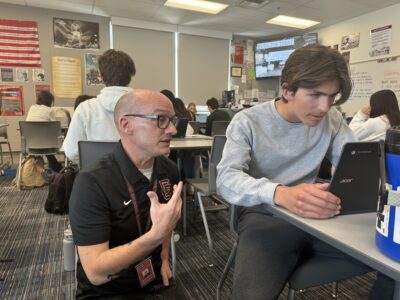Castaic homeowner and former NYPD officer Marc Manfro has lived with 9/11 every single day since terrorists toppled the Twin Towers, with every labored breath he takes, every time he gets up in the morning and every time he goes to sleep.
Less than two months ago, he emerged from the Providence Tarzana Medical Center, where he underwent surgery to correct the ill effects of exposure to 9/11’s aftermath.
Manfro, one of thousands of New York police officers assigned to Ground Zero after the terrorist attacks in New York City, suffers from an ailment many of his fellow former officers and other first responders have come to know all too well — a respiratory condition dubbed “World Trade Center Cough.” He moved to Southern California in a bid to breathe a little easier.
For Manfro, the respiratory problems led to a strain on his heart — so much so that the resulting cardiac condition caused him to collapse at least 10 times in the past couple of years.
Although the surgery in July was a success, concerns about the rhythm of his heart prompted a return to the hospital a couple of weeks after being released.
He was prescribed rest and told to take it easy — easier said than done when it comes to dealing with the deadliest terrorist attack on Americans in the history of the country.
“When I look back on 9/11, there are two points of concern,” Manfro said this past week.
“The initial biggest thing for me is for those hero policemen and hero firemen who lost their lives,” he said, and of course all of the nearly 3,000 who died in four coordinated attacks on Sept. 11, 2001.
“The other concern is for those who survived,” he said this past week, “exposure of all those policemen and firefighters to the fallout, who had all the quality of life taken from them.”
WTC Cough
The World Trade Center Cough was formally recognized by physicians studying the effects of pollutants released in the collapse of the World Trade Center buildings and explained in the medical journal, The Lancet.
In a special supplement titled: “World Trade Center Cough” published in The Lancet on Dec. 1, 2002, physicians concluded: “We felt it was critically important to characterize the particle exposure environment with respect to the chemical nature and health impact of particles that existed immediately after the collapse, and to examine the continuing air quality concerns around the World Trade Center.”
Manfro was officially diagnosed with reactive airways dysfunction syndrome, which is defined as the sudden onset of asthma following a high level exposure to a corrosive gas, vapor, or fume.
In the same Lancet supplement, it was reported that the U.S. Environmental Protection Agency collected samples of particulate matter around Ground Zero, including many measurements of ambient asbestos.
The day before the terrorist attacks, Manfro had just finished a grueling shift as a New York City transit officer patrolling the subway in Queens, as he’d done for 15 years.
Not scheduled to go back into work until late afternoon Sept. 11, 2001, Manfro was asleep inside his Long Island home when his wife, Terry, woke him up with the news that would change his life, his family, his fellow police officers, the city and the country.
In an interview with The Signal on the 10th anniversary of 9/11, he said: “From my family’s point of view, they were all happy that I wasn’t working because, obviously, you could get pulled into this vortex and get killed or hurt.”
But, Manfro did get pulled into that “vortex,” and he was hurt.


Ground Zero
In the days and weeks to follow Sept. 11, he, like thousands of New York City police officers, logged countless double shifts, working around the clock, helping to protect against a feared followup terrorist attack.
And, like thousands assigned to Ground Zero, he was one of those sidelined by a pronounced respiratory illness not yet identified, which was linked to the dust and debris experienced at Ground Zero.
Within a year, Manfro was hospitalized for respiratory problems so severe they affected his heart.
Now, 18 years later, after moving to Castaic from New York City for clean, dry air, those impacts from 9/11 are still in his heart and lungs.
“I got a headache at the end of every shift,” he said, recalling the experience before he went into surgery. “Then I started getting shortness of breath.”
“At Ground Zero, you would be walking through 6 inches of ash — of wood, plastic, all kinds of chemicals,” he said in July.
Whenever he completed his shift at Ground Zero, he said, he would put all his clothes in a garbage bag to disinfect the clothing.
“I didn’t want them (family members) contaminated,” he said.
So, when Wednesday rolls around, and he wakes up to another day with 9/11 ever present in his heart, his lungs, his soul, Manfro will be with his family — his wife, Terry, and two sons Steven and Marc — remembering friends both lost and alive.
Reflecting on his fellow 9/11 survivors, Manfro said: “Even though they lost a quality of life, they still have to be thankful that they have a life.”
661-287-5527
On Twitter @jamesarthurholt













